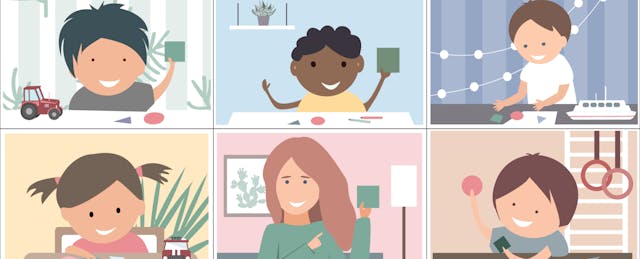Prepare Materials
For some of our students, hands-on learning materials are essential. Paraprofessionals are familiar with the activities in the classroom and could replicate these materials for home use. This would take the burden off teachers and parents and is a great way for paraprofessionals to continue supporting the learning of students.
Materials may include worksheet packets, file folder tasks, or manipulative kits. Taskboxes are another great remote learning support. Visit our blog each Wednesday through April for taskbox ideas to use at home or click the images below for our first two handouts.
Visual supports are also an important material for remote learning. We have provided a variety of our visual support tools for free download.
Gather Online Resources
Paraprofessionals can assist teachers in gathering useful materials for remote learning. They can look for fun art activities, visual recipes, online videos, or engaging games to supplement online instruction. Teacher can share lesson topics or weekly/monthly themes for paraprofessionals to search for. They can create a list of resources that will be helpful now and in the future when the units are repeated in other years. Here is a great resource to get them started! Click the image below.
Virtual Meetings with Students
Students are missing so much about school including their friends, teachers, and paraprofessionals! Paraprofessionals should be included in class virtual meetings so they can continue the important connection with students. Sometimes they may hold their own virtual meeting with students to continue facilitating social interactions with peers or to provide supplemental academic instruction. Leading routine activities from the classroom such as Morning Meeting, Zones of Regulation Check-ins, or read-alouds are also great way to stay connected with students. Additionally, paraprofessionals may have online "office hours" in addition to the teacher's office hours so there is more availability for students to get support while they are working on their assignments. Keep in mind, the teacher should still be the primary professional delivering instruction and assisting families just like when school is in session while the paraprofessional is providing supplemental supports.

Create Videos
Paraprofessionals extensive knowledge of classroom practices also makes them the perfect canidate for creating videos for students. These videos can illustrate instructional concepts, model completing daily living tasks such as washing dishs or brushing your hair, or facilitate routine classroom activities such as those mentioned above. Videos are great for students who are unable to attend virtual meetings, when repeated exposures are needed for learning skills, or when the activity is assigned daily.
Paraprofessionals could also create videos illustrating how to use classroom visual supports or instructional tools to share with parents. These videos can be saved for future use in trainings. For examples of videos illustrating our visual tools click the image below:
Videos can be saved and shared through Google Classroom or can be uploaded to YouTube as an unlisted video and the link can be shared with families.
Professional Development
We know it is often difficult for paraprofessionals to get away from the classroom to attend professional development sessions. Luckily, there are a variety of professional development opportunities online that paraprofessionals can take advantage of during school closures. Click the images below to go to the training sites.
There are 27 evidence-based practices (EBP) for autism. The AFIRM modules include specific information about each evidence-based practice, steps for implementation, and downloadable resources. Sign up for a free account to access the modules.
Like the AFIRM modules, the Autism Internet Modules address all 27 evidence-based practices for autism as well as additional information on common best practices at school, home, and in the workplace. Sign up for a free account.
The Pennsylvania Department of Education provides an annual paraprofessional training series across a variety of related topics including trauma-informed practices, reading strategies, and increasing independence. Access 10 years of sessions for free on their site.












No comments:
Post a Comment